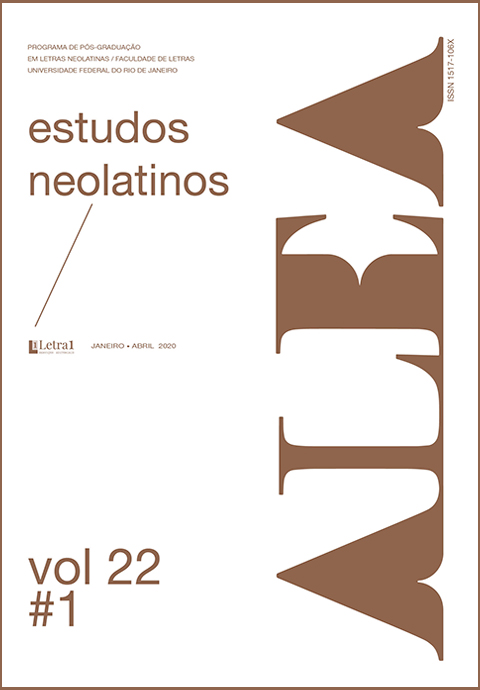La escritura colonial: agenciamiento de cuerpos y lenguas no tipográficas
Abstract
La escritura europea irrumpe en el espacio americano durante la Conquista. Diversos testimonios revelan esas dinámicas de jerarquización y dominación de voces y lenguas no tipográficas. La propuesta de este artículo es recontextualizar el proceso de agenciamiento de saberes y cuerpos a partir de la consideración de presupuestos teológicos y epistemológicos sobre la verdad y la preeminencia del Logos, y cómo se confrontó especialmente la voz hecha cuerpo en los cantos y bailes de los nativos americanos como fenómenos esquivos de este proceso.
Downloads
References
ACOSTA, José de. Historia natural y moral de las Indias. (F. d. Díaz, Ed.) Madrid: Consejo Superior de Investigaciones Científicas, 2008.
ADORNO, Rolena. Contenidos y contradiccionesla obra de Felipe Guaman Poma y las aseveraciones acerca de Blas Valera. CiberLetras: revista de crítica literaria y de cultura, n. 2, 2000.
ADORNO, Rolena. Guaman Poma and his illustrated chronicle from colonial Peru: from a century of scholarship to a new era of reading. Copenhagen: Museum Tusculanum Press, University of Copenhagen & the Royal Library, 2001.
ASCENCIO, Eugenio. La lengua compañera del imperio. Historia de una idea de Nebreija en España y Portugal. Revista de Filología Española, v. XLIII, n. 3/4), 1960, p. 390-413.
LA BIBLIA DE JERUSALÉN. Bilbao: Desclées des Brouwer, 1998.
CERRÓN- PALOMINO, R.; EZCURRA, A.; Zwartjes, O. Lingüística misionera Aspectos lingüísticos, discursivos, filológicos y pedagógicos. Lima: Fondo Editorial, 2019.
CERTEAU, Michel de. La invencion de lo cotidiano. Trad. Alejandro Pescador. Ciudad de México: Universidad Iberoamericana, 1990.
CUNILL, C.; GLAVE TESTINO, L. M. Las lenguas indígenas en los tribunales de América Latina: interpretación, mediación y justicia (siglos XVI-XXI). Bogotá: Instituto colombiano de antropología e historia, 2019.
DEL VALLE, José. “Historical linguistics and cultural history: The polemic between Rufino José Cuervo and Juan Valera”. In: DEL VALLE, José, GABRIEL-STHEEMAN, Luis (eds.). The Battle over Spanish between 1800 and 2000. Language Ideologies and Hispanic Intellectuals. London/New York: Routledge, 2002, p. 64-77.
DERRIDA, Jacques. Mal de archivo. Una impresión freudiana. Madrid: Trotta, 1997.
ENNIS, Juan Antonio. Miguel Antonio Caro, la lengua y la ley. RASAL Lingüística, 2013, p. 27-39.
ENNIS, Juan Antonio. “Language, politics and secularization: Language-ideological debates in the Latin American Press in the 1870s”. In: Marimón Llorca, Carmen; Schwarze, Sabine (eds.). Authoritative discourse in language columns: linguistic, ideological and social issues. Frankfurt: Peter Lang, 2019.
ERRINGTON, Joseph. Linguistics in a Colonial World. A Story of Languaje. Oxford/ Malden MA: Blackwell, 2003.
FOUCAULT, Michel. Las palabras y las cosas. Una arqueología de las ciencias humanas. México: Siglo XXI, 2002.
GREUßLICH, Sebastian. El pluricentrismo de la cultura linguística hispánica: política linguística, los estándares regionales y la cuestión de su codificación. Lexis, v. XXXIX, n. 1, 2015, p. 57-99.
GRUZINSKI, Serge. La colonización de lo imaginario. Sociedades indígenas y occidentalización en el México español. Siglo XVI-XVIII. México: Fondo de Cultura Económica, 2006.
HEREDIA, Juan Manuel. Dispositivos y/o Agenciamientos. Contrastes. Revista Internacional de Filosofía, v. XIX, n. 1, 2014, p. 83-101.
HELLER, M., & MCELHINNY, B. Language, capitalism, colonialism. Toronto: University of Toronto Press, 2018.
HOVDHAUGEN, Even. “Missionary Grammars. An Attempt at Defining a Field of Research”. In: ... and the Word was God. Missionary Linguistics and Missionary Grammar. Hovdhaugen, Even (ed.). Münster: Nodus, 1996, p. 9-22.
MIGNOLO, Walter. Nebrija in the New World: The Question of the Letter, the Colonization of Amerindian Languages, and the Discontinuity of the Classical Tradition. L’Homme, n. 122/124, 1992.
MILROY, J.; MILROY, L. Authority in Language. Investigating Standard English. London: Routledge, 2002.
MONAGAHAN, John. The text in the body, the body in the text. The embodied sign in mixtec writing. In: BOONE, Elizabeth Hill; MIGNOLO, Walter (eds.). Writing Without Words: Alternative Literacies in Mesoamerica and the Andes. Durham, NC: Duke University Press, 1994.
POMA DE AYALA, Guamán. Nueva corónica y buen gobierno. V. I. Caracas: Biblioteca de Ayacucho, 1980.
ROJINSKY, David. Companion to Empire. A Genealogy of the Written Word in Spain and New Spain (c. 550-1550). Amsterdam: Rodopi, 2010.
SANTO TOMAS, Domingo de. Grammatica o arte de la lengua general de los indios de los reynos del Peru. Valladolid: Francisco Fernández de Córdova, 1560.
ZWARTJES, O.; HOVDHAUGEN, E. (eds.) Missionary Linguistics/Lingüística misionera. Selected papers from the first International Conference on Missionary Linguistics. Oslo, 13-16 march 2003. Amsterdam & Philadelphia: John Benjamins, 2004.
Downloads
Published
Issue
Section
License
THE AUTHOR/S confirm/s his, her or their participation in all stages of work preparation: 1) Conception, project, bibliographical research, analysis and interpretation of data; 2) Writing and reviewing the manuscript; 3) Approval of the final version of the manuscript for publication; 4) Responsibility for all aspects of the work and guarantee for the accuracy and integrity of any part of the work. The submission of works implies the immediate cession, without onus, by all authors, of publication rights to the journal Alea, licensed under CC BY (https://creativecommons.org/licenses/by/4.0/). The authors are fully responsible for the content of the article and continue to hold all copyrights for subsequent publications of it, and should, if possible, include the reference to the first publication in the journal. Alea does not commit to returning received contributions. Authors of articles, reviews or translations will receive a copy of the journal.

